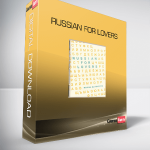Russian For Lovers
$28.00
The book is arranged as a phonetic and romantic primer for a lover, teaching him not just the outlines of runes but the ideas and forms they are entwined with. Each poem riffs off a letter in the Russian alphabet, and each follows the shape, rhyme, “feeling” or sound of a letter.
- Description
Description
 Russian For Lovers
Russian For Lovers
Lifetime support – Download unlimited when you buy Russian For Lovers Course at Course Farm. The market leader in online learning – Offers a variety of diverse topics: Internet Marketing, Forex & Trading, NLP & Hypnosis, SEO – Traffic, …
Reviewing a new volume of poems by a bright young Russian-American poet, one retreads through a host of taxonomic issues.
To condense the debates of an entire critical discipline into a telegramattic brief, the literary output grouped together until the sobriquet of “Russian-American poetry” is plagued by a host of problems: intertextual interpretation, cross-cultural communication, theoretical translation, mimetic mirroring, and—not least of all—bilingual language competency.
In short, one faces all the conflicts inherent in the duality of steeping one’s tea in two pots simultaneously.
Matvei Yankelevich offers us a shrewd analysis of many of these issues in his essay “The Russians Are Coming! The Russians Are Coming!” (online here) when he points out that “what would appear to be a small coterie is really a prism reflecting most theoretical debates between poetic schools that exist in the American as well as in the Russian context.”
The bright young Russian-American poet under review here is Marina Blitshteyn, a Moldovan born, Jewish woman (and none of these descriptors are incidental; all appear thematically in her intently autobiographical but not immodest poems).
Reading her lightly cadenced first book,Russian for Lovers, one would do well to remember some of the heretofore-mentioned debates; though of course set away at a wry angle from theoretical antecedents, Russian for Lovers is lyric-romantic in a certain tremulously innocent Russian vein, and plain-spoken modernist in another.
Though there are fairly different sorts of poems in the book—dialogue poems, a poem with a large oval circle the length of the page with the Russian word for lake in the center, a Summer Travel-Graduate Degree-Wedding-Tenure timetable—the common denominator is Blitshteyn’s attentiveness to internal rhymes and sinuous flow.
The book is arranged as a phonetic and romantic primer for a lover, teaching him not just the outlines of runes but the ideas and forms they are entwined with. Each poem riffs off a letter in the Russian alphabet, and each follows the shape, rhyme, “feeling” or sound of a letter.
The morosely pneumatic M stands for “my little mother.” C or CCCP (pronounced like an s in Russian, with the poem interrogating both sounds and meanings) is for “sister/system,” or when we learn our letters through the prism of Communism. That old union of soviets may not be what she made herself out to be—communism is not a utopia / fellow travellers say / communism is a sure sell / communism is a sister city—though she knows what she wants and we should “make sure / make sure / communism gets her way / somebody pull her hair.”
And then there is Ж, the voiced postalveolar fricative, which is “already tightening under the tongue / that pressure to drum or run / already cracking the mark into parts,” and which begins the chanting of the anti-Semitic refrain ЖЫД ЖЫД ЖЫД (though the correct spelling of “Zhid” in Russian is ЖИД, unless I am missing another meaning the poet intended).
Although it is about being called a racial slur, the poem is not self-pitying, preachy, or pedantic. The incantation is repeated “until it numbs its meaning” but is it is recuperated and refracted by a self-willed act of negation at the end of the poem, even though it is “still hard buying the translation / believing in it enough to say / I’m already a new constant / I know my American name.”
With her primer of the elemental letters and lessons of love, Blitshteyn has composed a lovely debut book of poems. I for one am expecting my next lesson eagerly.



